
|
Hugh Masekela and Chissa All-Stars
presented by Small World Music & Karibuni Radio |
|
| February 15, 2008 • The Phoenix Concert Theatre • Toronto |
|
|
|
|
|
|
Grazing at The Phoenix — Can You Dig It?!
by Laila Boulos with photos by Roger Humbert |
| What better way to celebrate Black History Month than seeing the Grand Pooh-Bah, Hugh Masekela, a staunch activist who has, for decades, fought both inside and outside South Africa to draw attention to; create change for; and, empower the people of Africa. This event was being presented as a collaboration with Small World Music and Karibuni Radio (CIUT 89.5FM).
Hugh Ramopolo Masekela has a long and winding history — both musically and geographically. Born in 1939 near Johannesburg, he was forced to flee, repeatedly, due to his loud and insistent protests against his country's many oppressive regimes. After The South African Defense Forces, The Sharpville Massacres and other apartheid-related brutalities he escaped to the U.S. and the U.K. Today, he is happily back residing in Africa.
A gifted musician with chameleonic style, Masekela's music incorporates township music influences from the 1930s to the 1960s and forms the foundation for his vast expertise in African, jazz, bebop, Afrobeat, funk and hip-hop music. And the list goes on.
|
| Standing in the very long line in front of the Phoenix, a number of different languages could be heard drifting among the concertgoers. This was definite proof of Hugh Masekela's wide appeal. With the official 'doors open' hour having come and gone, scarves and mitts were being shared on this cold evening as people waited to enter. |
|
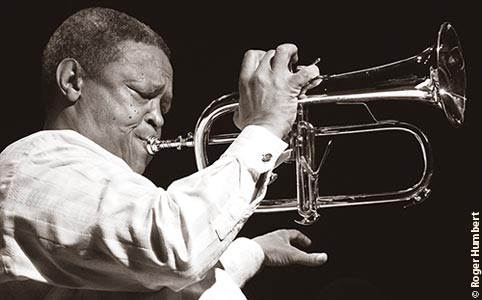
Hugh Masekela |
|
| Inside, the very funkified music of DJ Medicineman (CIUT 89.5FM) was warming up the coals. Although many people were still outside in the slow-moving line, Small World Music's Alan Davis along with Nadine McNulty (of Karibuni Radio) and Opiyo Oloya, both very active in the Black community in Toronto, greeted everyone from the stage. Opiyo had the privilege of heralding to the steady influx of people: "The man who inspired two generations of African Jazz. The Godfather of African Jazz, Hugh Ma-se-ke-la!" among gregarious cheers and applause as the band slipped into position.
The opening lines of "The Boy's Doin' It" had the crowd grooving as it stirred up the funk ante. And any thoughts of the cold they had just left became a distant memory. Then, right on cue, a man from the audience slid in front of the stage and began dancing alone just as the lyrics changed from "Doin' it" to "The boy's doin' it" amidst howls from onlookers. As the song continued referencing where this boy was 'doin' it', the locations of Toronto and Soweto received the loudest cheers and applause as Masekela sang around the globe.
Later, Masekela announced, "We are going to pump you up" as disco lights danced around the room while the audience cheered at the prospect. Continuing with, "We are going to introduce you to some of South Africa's talents", Masekela called upon his 'sister', the operatically gifted vocalist, Sibongile Khumalo who took over the stage with her wonderful Mother Earth soulful presence.
|
| Hurling her tsunami-powered vocals into a medley of South African township songs that defined the sound of the '50s, Khumalo hoped out loud that people would feel the urge to tap their feet and snap their fingers. Without missing a beat, literally, her people complied. Providing the 'performer' aspect of the evening, Ms. Khumalo gave the audience her thoughts on aerobics. Asserting that people do them "to be seen", she jokingly bounced around imitating a rather deranged aerobics aficionado. Then, suggestively motioning to her own curvaceous figure, she announced, "People my size have enough body to be seen", as she strutted across the stage while the audience burst into laughter.
The next song, "When Love Calls You, Joy Finds You", was a platform for Ms. Khumalo's effortless scatting abilities and the perfectly timed banter between Masekela's flugelhorn and Ngenekhaya Mahlangu's saxophone. The many solos and intertwining banter between instruments flowed as in a dream during the majority of the evening.
Changing the mood, Nkosinathi Collen Gcabashe, with his warm presence and wonderfully soothing vocals, took over from Khumalo. His opening piece "sent out to all friends", was surprisingly very moving despite its backdrop of upbeat instrumentals and shimmery vocals. Uttering, "When we are one South African collective," garnered him touchdown-inspired howls.
The next song, celebrating brides everywhere, saw a flurry of women approach the front of the stage to dance. Later a few brave men joined the throngs. This is the type of song made to be played at festivals or during the credits of the-good-guy-wins movies. On his own solo, Masekela teased the audience as he made some creative musical allusions to his "Grazing In The Grass" super-hit.
The rolling rhythm of the music ebbed and flowed in intensity at different periods during the evening while never losing that foundation of groove. And, the many solos of Masekela's long-time electric guitarist, John Blackie Selolwane, were a slick blend of Wes Montgomery and George Benson cool leaving the audience awe-struck. It was clear that Masekela's goal was to showcase his Chissa All-Stars so he remained musically in the background for most of the night.
Another example of Masekela's finds, Tshepo Mngoma's spellbinding antics were stunning. At one point, it appeared he was exorcizing demons from his violin during an extended solo that should have received much greater applause from the audience. But, they were probably too stunned by the inferno that just took place to applaud... or breathe!
|
|
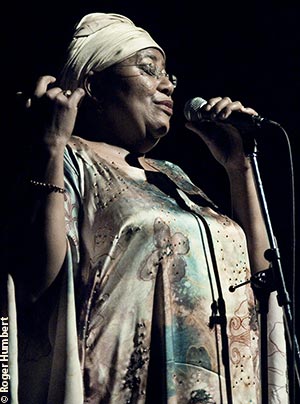
Sibongile Khumalo |
|
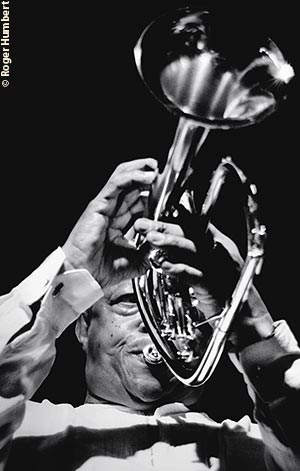
Hugh Masekela |
|
|
| The musical volleyball bounced around the stage for the duration of the evening allowing everyone long periods under the spotlight as they were expertly softly illuminated during their solos while the rest of the stage became dramatically darker.
An amazing duo between Masekela and Ngenekhaya with their instrumental banter was jaw-dropping and jumped out of nowhere to shock the audience. The following piece, "Stimela (The Coal Train)", opened with gospel-flavoured keys then transformed into an island Caribbean piece with an apex of a gorgeous saxophone solo.
When Khumalo reappeared on stage to sing Ibrahim Abdullah's "Tsakwe (Royal Blue)" although her voice appeared to flow effortlessly from her body, afterwards, one could see how much she gave to the song. Tshepo, after calming down his violin from the previous song, lovingly demonstrated the softer side of his talents. Masekela, although allowing his protégés to take over most of the evening, showcased some of his massive abilities on this piece as the whimsical call-and-response scatting between himself and Khumalo reached balloon-to-pin crescendos.
On one song, the audience realized that Ms. Khumalo had actually been holding back all evening as her Beverly Sills/Measha Brueggergosman operatic bounty poured forth as she was goaded by Tshepo's antics. For her efforts, she was quickly greeted with crashing applause and cheers while people almost dropped their beers around the room.
The two distinct opening beats to "Grazing In The Grass", Masekela's 1968 hit caused a fire-hydrant gush of people, filling the scant leftover floor space. Originally a filler recorded in just 30 minutes (released on UNI Records, a subsidiary of MCA Records), it reached number one on the Billboard Hot 100 Chart and sold over 4 million copies worldwide! People were probably dancing in the washrooms at this point! Masekela finally led the kind of riveting lengthy solo the crowd had been waiting for all night. There were also many solo bursts that spun out in creative tangents on this extended version causing a standing ovation that continued for the rest of the evening.
Masekela then calmed the audience as he recounted the story of illegal hooch in South Africa relating how the police cracked down on people with one hand while supplying it with the other. He told the story speaking in an exaggerated accent stating he was from Louisiana, making reference to the plight of those still ravaged by the aftermath of Hurricane Katrina. As the song began, he had the whole room involved in a police-are-coming warning chant complete with vigorous jumping. During this piece Masekela transformed himself into a caricature of 'Reverend Masekela' as his tone mockingly prodded the crowd to repent.
|
| Throughout the evening Masekela gave his Chissa All-Stars the freedom to entertain the audience with eloquent solos and goofy on-stage antics, yet he never lost the focus of calling to mind the plight of the African people and their constant battles for respect and freedom. His voice was bittersweet while informing the audience that on April 27, 2008, South Africa will celebrate 14 years since the end of apartheid!
Masekela began playing the piano at the age of six. In 1954, receiving a trumpet from Archbishop Trevor Huddleston changed his musical focus. His professional musical foray began with the African Jazz Revue (1956). Later, he formed the Jazz Epistle Verse 1, which included Dollar Brand (who later became Abdullah Ibrahim). It was proudly the first African band ever to record and perform to record-breaking audiences. During one of his many forced escapes from his beloved South Africa, Masekela recorded "The Americanization of Ooga-Booga". In 1981 he began the Botswana International School of Music and wrote the musical Sarafina then later created the record label Chissa. Masekela's famous piece, "Bring Him Back Home", became Nelson Mandela's anthem during his world tour once he was released from prison (February 11, 1990).
|
|
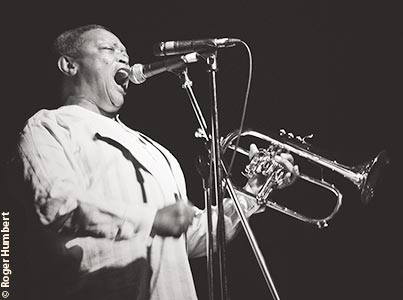
Hugh Masekela |
|
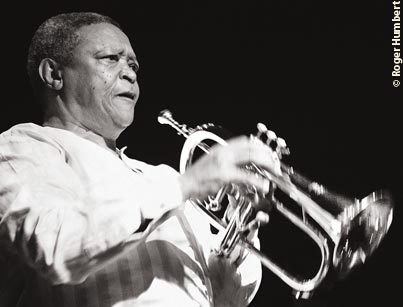
Hugh Masekela |
|
|
| At this point in the evening, Masekela introduced some of the many talents from his Chissa school. Directed by bandleader and flugelhorn player, Hugh Masekela, the Chissa All-Stars are: Francis M. E. Fuster, Percussion; Nkosinathi Collen Gcabashe, Vocals; Ian Herman, Drums; Sibongile Khumalo, Vocals; Ngenekhaya R. Mahlangu, Saxophone; Tshepo Mngoma, Violin; Themba Elliott Mokoena, 2nd Guitar; John Blackie Selolwane, 1st Guitar; Arthur Tshabalala, Keyboards and Abednigo Zulu, Bass.
The musical tour took the audience through many genres of African music including: kwaito (South African hip-hop), jazz, funk and African folk styles. Although Chissa began as a record label, today it is The Chissa Entertainment Group and encompasses a school that teaches Africans every aspect of the music industry as well as a complex entertainment organization that develops screenplays and musical theatre. This tour definitely showcases some of the many bright stars coming from the Chissa School!
At this point, Masekela became very serious as he told the story of the jailing of Nelson Mandela over 60 years ago as he stated with conviction that, "Never will one group dominate another!” The emotion in the room was palpable. Although throughout the evening Masekela and his Chissa All-Stars were bantering amongst each other and having creative fun with their solos, once the band played their final piece, "Bring Him Back Home", the mood changed. The room filled with the emotional lyrics as everyone joined in to sing along with ".... Bring him back home, Nelson Mandela. I want to see him walking down the streets of South Africa..." It was a powerful ending to a magnificent evening of history, brotherhood and incredible musical artistry.
|
|
|
|
|
|






